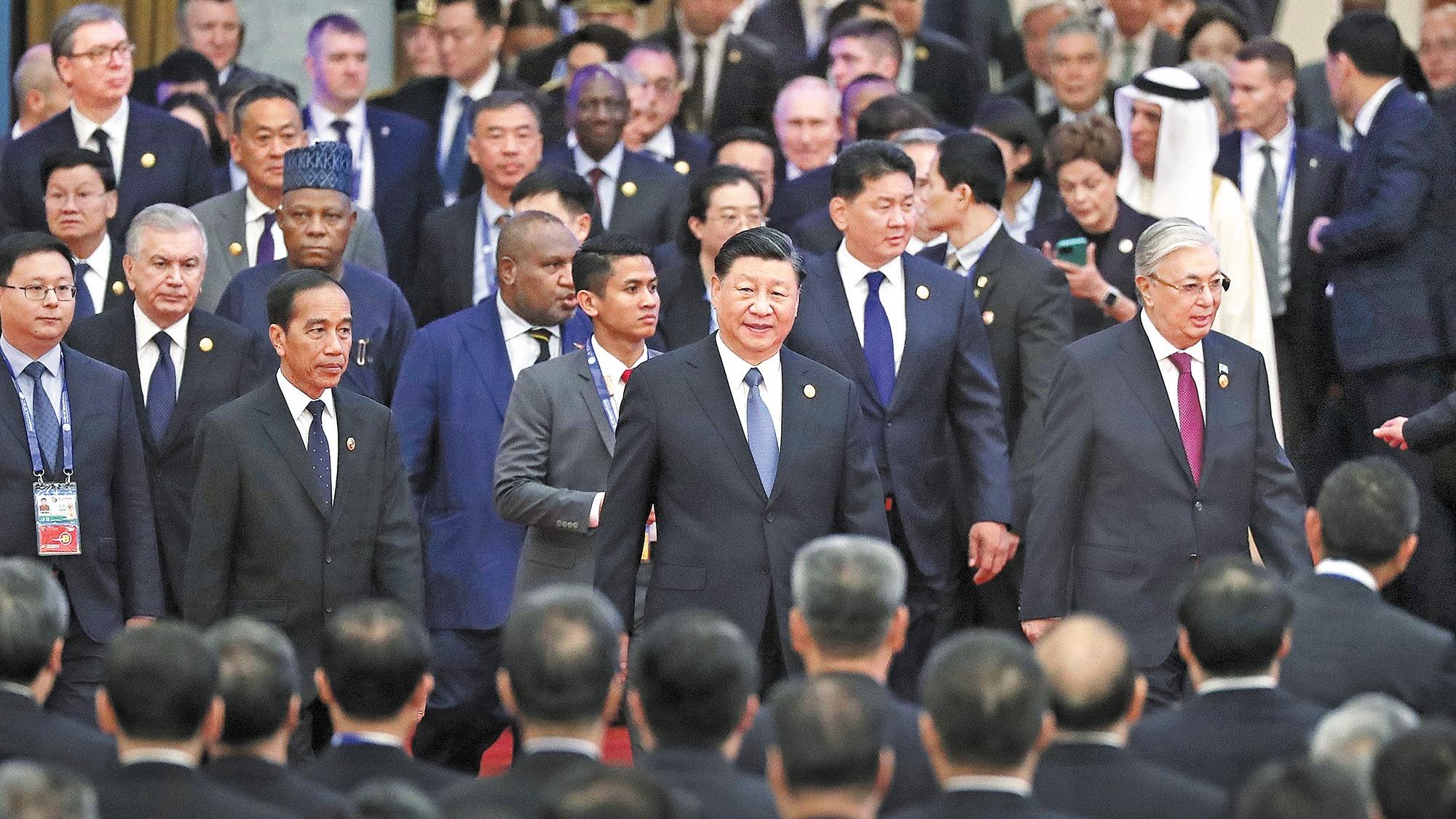Experts laud president’s words at forum highlighting the need for shared global prosperity
 President Xi and foreign leaders walk into the venue for the opening ceremony. (WANG ZHUANGFEI / CHINA DAILY)
President Xi and foreign leaders walk into the venue for the opening ceremony. (WANG ZHUANGFEI / CHINA DAILY)
Japanese experts highly praised the keynote speech delivered by Chinese President Xi Jinping on Oct 18 at the opening ceremony of the third Belt and Road Forum for International Cooperation in Beijing, and expressed appreciation for the achievements of the China-led Belt and Road Initiative (BRI) amid its 10th anniversary.
Belt and Road cooperation promotes connectivity, mutual benefit, common development, cooperation and win-win outcomes, Xi said in his speech.
“What has been achieved in the past 10 years demonstrates that Belt and Road cooperation is on the right side of history. It represents the advancing of our times, and it is the right path forward,” Xi said.
Kazuyuki Hamada, international political economist and former parliamentary vice-minister for foreign affairs of Japan, said: “President Xi made an impressive speech in connection with the vast network of China-to-Europe freight and human corridors which have economically integrated the Eurasian landmass through linking major capitals in Asia and Europe.”
Regarding Xi’s announcement of eight major steps that China will take to support the joint pursuit of high-quality Belt and Road cooperation, Hamada said: “The eight steps he announced were the most ambitious and challenging (measures) to address today’s international economic and security needs. The modern-day Silk Road project is futuristic in covering not only the ground and ocean but also space infrastructure.”
Recognizing the fact that the China-Europe Railway Express has already connected more than 100 Chinese cities to over 200 cities across 25 European countries and regions and many Asian nations, Japan needs to find a path to the common ground to work together in such a vast transcontinental freight and human exchange system, he said.
“I hope everyone of us would carefully and open-mindedly listen and read President Xi’s dynamic proposal to direct the world into a much more peaceful and prosperous environment. It is expected that such an endeavor would open a window for a productive dialogue among all the concerned countries including China, the United States and Japan,” Hamada added.
Takakage Fujita, secretary-general of the Association for Inheriting and Propagating the Murayama Statement, a Japanese civic group dedicated to upholding the 1995 Murayama Statement that admits Japan’s wartime mistakes, said: “President Xi’s speech was well-crafted and truly magnificent. It was indeed an outstanding speech with the potential to connect diverse regions of the world.”
Fujita, who is visiting Beijing with four other members of the association, said it is important for Japan to actively participate and make efforts in advancing the BRI.
A fundamental aspect of the initiative is to promote the prosperity and development of regions worldwide and achieve win-win development for a community with a shared future for mankind, he said.
Kumiko Haba, professor emeritus at Aoyama Gakuin University in Tokyo, said: “As someone who has been observing the BRI for 10 years since its inception in 2013, I would like to extend my congratulations and express my respect for the comprehensive 10-year achievements analysis that is currently underway.”
The BRI is a global initiative that has achieved significant development and aims to advance the world economy toward prosperity by emphasizing infrastructure and investment, Haba noted.
Instead of hoarding the wealth from its rapid economic development, China has allocated investments and infrastructure to its neighboring and less-developed nations. Despite the anti-China propaganda from the United States and Europe, the less-developed countries have persisted with a belief in humanity’s inherent goodness and have used the wealth distributed through infrastructure construction under the BRI to alleviate disparities and poverty, she said.
“The participation of more than 150 countries in the BRI is not only a testament to China’s efforts but also an outcome of China’s reformations that were made to enhance the world’s prosperity and development,” Haba said.
Satoshi Tomisaka, a professor at the Institute of World Studies at Takushoku University, said: “As mentioned in President Xi’s speech, the BRI has entered an era where specific results are being witnessed, moving beyond a vague vision. The confidence in this was evident in the speech.”
The success of relationships that center around the rights of people seeking development and prosperity is summed up in one sentence that “win-win cooperation is the sure way to success in launching major initiatives that benefit all”, he said.
Yoshikazu Ono, representative of the Japan-China Belt and Road Promotion Association, said Xi’s speech has “provided a comprehensive review of the past decade and presented future prospects”.
Building upon the foundations of the ancient Silk Road, the BRI has made substantial contributions to various continents, including Asia, by realizing projects such as highways, high-speed railways, and port terminals, Ono said.


